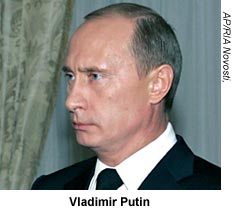New York, July 11, 2007—The upper house of the Russian parliament today approved a package of amendments that would expand the definition of extremism to include public discussion of such activity, and give law enforcement officials broad authority to suspend media outlets that do not comply with the new restrictions. The package, proposed by deputies from the ruling United Russia party, now goes to President Vladimir Putin to be signed into law. The lower house, the state Duma, approved the measure on Friday.
Ostensibly designed to fight extremism—including the growing nationalist and neo-Nazi movements—the new measures would have the effect of muzzling critical voices, according to research by the Committee to Protect Journalists. Today, CPJ expressed grave concern that the amendments will be used to silence government critics, and it called on the Russian president to veto the legislation.
“The vague language of these amendments makes them ambiguous and all-encompassing,” CPJ Executive Director Joel Simon said. “They provide Russian authorities with yet another set of tools to silence critics and chill independent news coverage in the countdown to Russia’s parliamentary and presidential votes. We call on President Putin to exercise his responsibility as a democratic leader and veto these draconian measures.”
This is the second set of anti-extremist amendments introduced in Russia in as many years. Amid domestic and international criticism, Putin signed amendments in July 2006 that broadened the definition of extremism to include media criticism of state officials. As with the 2006 bill, the new set of amendments was approved quickly despite concerns from media, human rights, and political opposition groups.
Amendments to the Law on Fighting Extremist Activity require news media to label as “extremist” in their reports any organization that the government has banned as such. The government intends to issue a list of such groups in coming weeks.
Another amendment expands the definition of extremist activity to include “public justification of terrorism or other terrorist activity.” The bill does not define the term “justification,” leaving critics to suggest that it will be interpreted very broadly.
Gennady Gudkov, a State Duma security committee member and a colonel in the Federal Security Service (FSB), told the independent Moscow radio station Ekho Moskvy that the measure makes it impossible to “differentiate between extremist statements and an ordinary controversy, political argument, or criticism of the state.” The determination, he said, is left to state agencies.
An amendment to Russia’s Administrative Code would regulate the production and distribution of “extremist” material. The amendment does not specify what constitutes extremist material even as it introduces new penalties for journalists, media outlets, and printers found guilty of the offense. Penalties range from fines and confiscation of production equipment, to the outright suspension of media outlets for up to 90 days.
Amendments to Russia’s Criminal Code expand the definition of extremism as a crime motivated by “hatred or hostility toward a certain social group” without clarifying the term “social group.” Such broad language could prevent media from reporting on public officials or powerful businesspeople, analysts said.
An amendment to the Law on Surveillance gives officials broader grounds to tap telephones. Under the amendment, court approval for phone taps may be obtained for suspected crimes as minor as hooliganism. “They [authorities] will tap the phones of the people they need to eavesdrop on—those in the opposition, those who voice criticism,” Gudkov told Ekho Moskvy. “It’s simply a revolution in this area.”
In May, CPJ named Russia one of the world’s worst backsliders on press freedom. Recent history offers a guide as to how the new measures might be used.
The Moscow-based Media Law and Policy Institute said Rosokhrankultura, the government’s media regulator, issued 32 warnings to Russian media outlets in 2006 concerning their coverage of purported extremist activity. The independent radio station Ekho Moskvy has reported receiving 15 warning letters from FSB officials and prosecutors in the past two months. Aleksei Venediktov, the station’s editor-in-chief, told the Financial Times that authorities demanded that Ekho Moskvy explain why it interviewed opposition leaders Garry Kasparov and Eduard Limonov of the coalition Other Russia.
The amendments have already sown alarm and confusion among Russian journalists, who say the measures may further chill news coverage ahead of Russia’s parliamentary and presidential elections. The uncertainty was reflected in a Ren TV report last week. “For good reporting it is important that the correspondent be at the scene—but working under the new conditions will be a thankless task. Sometimes it is really better to keep quiet than talk,” according to a transcript of the report.
